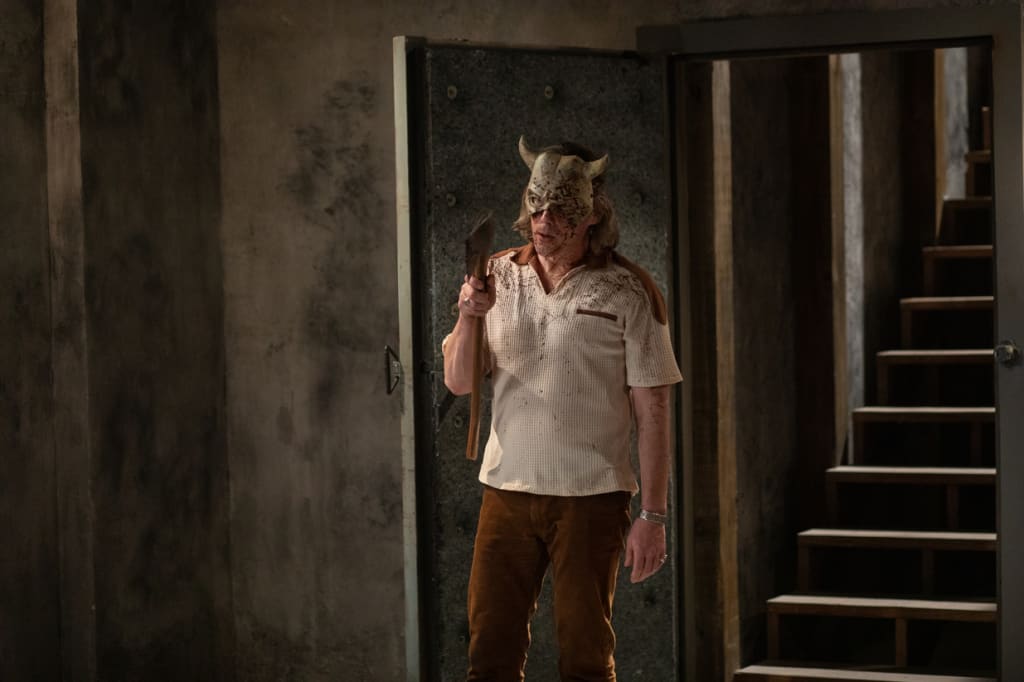The Black Phone (2022) Movie Review
Thriller / Drama

At the age of 13, I experienced my first horror movie that truly left me trembling. It was Scott Derrickson's "Sinister," and even after rewatching it multiple times and seeing countless horror films since then, it still manages to send shivers down my spine. So, when I heard about "The Black Phone," a film directed by Derrickson, co-written by Robert Cargill, and starring Ethan Hawke, I knew I had to watch it.
In "Sinister," Derrickson's victims were trapped in a web of their own demise. However, in "The Black Phone," the film connects the victims through a thread crucial to their survival. Based on the short story by Joe Hill, son of Stephen King, "The Black Phone" tells the story of The Grabber, a child killer who snatches teen boys in broad daylight and never returns them. Finney, played by Mason Thames, becomes The Grabber's next captive, held in a soundproof basement, and begins to receive phone calls from The Grabber's previous victims through a disconnected landline.
The film's style is nostalgic, reminiscent of the 70s with warm browns, oranges, and filtered light flooding the screen. It is only the vibrant red of blood and the neon police lights that interrupts the otherwise consistent color scheme, making those moments all the more jarring. The basement walls are weathered concrete painted with brushstrokes of rust and blood, an evidential mural of violence unfettered. The upbeat 70s soundtrack is interrupted by a bassy, resonant score that reverberates in your ribs, sinks into your eardrums, and sounds as if you are hearing it from underground in The Grabber's basement. The film's opening credits show a nostalgic B-roll of the halcyon everyday occurrences of suburban youth- popsicles, baseball games, and sunny avenues- only to be interlaced with the vision of bloody knees and stacks of missing persons posters.
This juxtaposition of calm and violence festering underneath is not only stylistic but thematic as well. Timid Finney and his spunky sister Gwen, played by Madeleine McGraw, go home to an abusive, alcoholic father after dealing with belligerent bullies at school. "I'll look after Dad," becomes a pattern of dialogue throughout the film, with Finney left to return home while his sister stays with a friend. Siblings raise each other, kids protect each other from bullies, while school staff is absent during adolescent brawls. Gwen, with her clairvoyant abilities, leads the police investigation, and past victims communicate with Finney while he's in the clutches of a killer. It's this commonality of a child-to-child support system in the absence of reliable adults that makes "The Black Phone" more than a simple story.
Derrickson and Cargill crafted a nuanced, multi-layered narrative that takes horror elements and supports them with an attentive discussion of cycles of abuse, trauma, and the bond of youth. Hawke's Grabber is characterized by personality reversal. His faux-jolly disposition flaunts animated mannerisms and a high-pitched voice, eerily childlike and suggesting trauma-based age regression behavior. This contrasts with the adult-like profanity and maturity with which the kids speak. But the zany harlequin act is fleeting, leaving Finney at the mercy of a total change- a husky, deep tone of voice and unforgiving, violent demeanor. It's in these moments where Hawke flexes his performance and versatility. His villainy is unpredictable and volatile, and he expertly tiptoes a dissonant line of sprightly youthfulness and depravity.
By the time the final act rolls around, "The Black Phone" has fully established its characters and their motivations, making the ensuing tension that much more palpable. The film doesn't rely on jump scares or cheap thrills to create fear. Instead, it relies on a slow burn approach, building suspense through its characters and their interactions. When the climax finally arrives, it's a satisfying payoff to the tension that has been building throughout the film.
One of the standout features of "The Black Phone" is its attention to detail. From the production design to the sound design, every element of the film has been carefully crafted to create a specific atmosphere. The sound design, in particular, is exceptional, with a score that alternates between haunting and jarring, and sound effects that are designed to make the viewer feel as though they are in the basement with Finney.
Overall, "The Black Phone" is a masterful horror film that transcends the genre. It's a film about trauma, resilience, and the power of human connection. Derrickson, Cargill, and Hawke have all brought their A-game, but it's the performances of Thames and McGraw that truly elevate the film. Their chemistry as siblings is palpable, and their emotional range is impressive. "The Black Phone" is a film that will leave you thinking long after the credits roll, and is sure to be remembered as a modern horror classic.






Comments
There are no comments for this story
Be the first to respond and start the conversation.